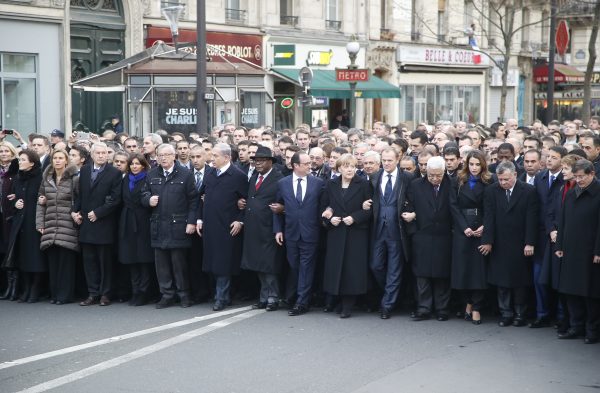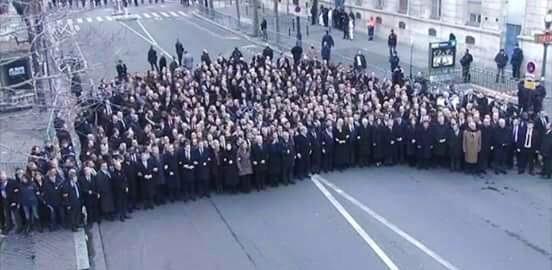Forgive my bluntness, but I can’t help noticing the odd Western response to the Charlie Hebdo tragedy. It’s so abstract. The rallies, the symbolism, the arm-in-arm marches, the dramatic storyline between freedom of speech (the pen) versus religious fanaticism (the gun).
Terrorists raid a magazine headquarters and shoot people, and the first response is for millions of people to walk with signs? To flood Twitter with clever hashtags? Public leaders and the media are claiming this is all to “show solidarity.” But to whom is everybody showing their solidarity? To their neighbors who already agree with them and share their same culture? All of this seems like a peculiar way to react to an act of terrorism.
If I were feeling cynical, I’d say that Charlie Hebdo is being used by some people as a social media opportunity, complete with Twitter hashtags and memes. It’s an excuse for people to take selfies and identify with a “cause,” to show people how civilized they are. If that sounds harsh, take a look at photos from the big “rally” in France. Political leaders locking arms and marching in solidarity – meaning, photographers and organizers getting paid to stage a photo op for political gain.
Here’s the photo you saw:
Looks like political leaders are in front of a crowd, participating in the rally. Here’s what it actually looked like:
Politicians separate from their constituency, quartered off from the public to create a pretty photo op – no different than a President throwing out a pitch at a baseball game. This image is deliberately crafted by a group of political staffers to make their bosses look good.
So I ask: what have these rallies accomplished? Whose mind has been changed by public demonstrations? Surely no radical Muslim’s. Painting a dramatic narrative of Western civilization versus barbarism sounds romantic, and it certainly whips up people’s emotions, but does it do any good? Does it affect anything outside of our own emotions? I don’t think so.
I don’t bring this up to be a curmudgeon. I sincerely want to make a difference, and I’m convinced that idly demonizing acts of terrorism and showing solidarity with each other is pointless. A more effective response – though it’s considered heresy in the West – is to see terrorists as rational humans, not as raving lunatics. The terrorists had reasons for their actions, and they acted in accordance with their beliefs. If we want to prevent such occurrences from happening again, we must understand their reasoning and motivation, rather than simply characterize them as “evil” with no more elaboration needed.
I’m not defending their actions; I am simply recognizing they have beliefs which should not be immediately thrown in the waste bin. If Charlie Hebdo is a tragedy, then where did the terrorists go wrong in their thinking? Was it the religious fanaticism – their particular interpretation of the Koran? Was it political extremism, not grounded in rationality? Was it their cultural beliefs about violence?
The best way to answer these questions is to listen to the terrorists themselves. On many occasions, radical Muslims have explained the rationale for their actions. Turns out, they aren’t foaming-at-the-mouth savages. For example, take audio footage from a grocery store in France, where one terrorist took several hostages. He explained, quite clearly, that his actions were because of the French military’s behavior in the Middle East. Frenchmen pay taxes to their government, and their government kills innocents in the Middle East, therefore this terrorist was going to exact revenge for their complacency:
Not the ramblings of some schizophrenic madman. And unless we recognize this, we’ll never persuade any radical Muslim who is on the fence about joining the same cause as these men. We must engage the ideas – both religious and political – if we want to dissuade future terrorists from being persuaded by bad ideas.
The battle is not between insane jihadists and rational Westerners. And it’s not between pious jihadists and evil Westerners. The simplistic good-versus-evil narrative is wrong in both directions. It’s too easy to demonize one side or the other – that’s how wars get started.
I realize it sounds weak and soft, but if we sincerely want to persuade people to change, we must begin by listening to each other’s ideas. Maybe – just maybe – all angry jihadists don’t hate the West for our “freedoms.” And maybe – just maybe – the West is not engaged in an debaucherous assault on Islam or Christianity. The only way to find out is to muster some basic level of respect for one another and listen. That would be a far more concrete reaction to the Charlie Hebdo tragedy than creating symbolic art.

